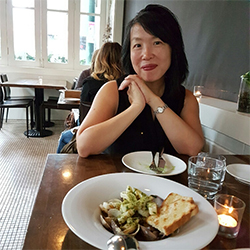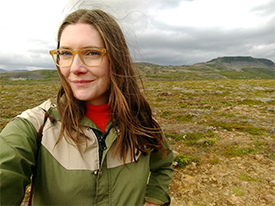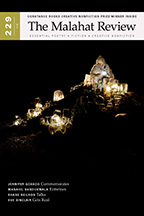Live Like a Luddite: Emma Skagen in Conversation with Evelyn Lau

Malahat volunteer Emma Skagen talks with Open Season Award poetry judge Evelyn Lau about early publication, the Vancouver life, and humour in poetry.
Evelyn Lau is the Vancouver author of twelve books, including seven volumes of poetry. Her memoir Runaway: Diary of a Street Kid, published when she was 18, was made into a CBC movie. Her prose books (short stories, essays, a novel) have been translated into a dozen languages worldwide. Evelyn's poetry has received the Milton Acorn Award, the Pat Lowther Award, a National Magazine Award, and a Governor General's nomination. Read more here.
You started publishing poetry at a remarkably early age. Since then you've gone on to write an incredibly diverse oeuvre: a memoir, poetry, short stories, essays, a novel. Do you think your early start has benefitted your development as a writer? Or, perhaps, has it been a struggle to have your artistic growth be so public? Do you have a constant drive to outdo your former selves?
In some ways my writing life has had a backwards trajectory: a big splash of attention for the early prose books, published in my teens and twenties, then decades of toiling in obscurity as a starving poet! I'm grateful now to have experienced those years of interest in my work, because many writers labour lifetimes without reaching audiences beyond the handful of people who buy literary magazines or attend poetry readings. My early success feels very distant now, and foreign. But in some ways it's all a continuum; I began by publishing in literary journals, and that's what I do now as a poet. I've been entirely focused on poetry for the past 15 years, and it's liberating because there is no correlation between poetry and book sales, bestseller lists, media attention and other things that prose writers obsess about.
In 1994 the CBC released a movie based on your teenage journal and bestselling book, Runaway: Diary of a Street Kid. This strikes me as being, in a sense, every teenage writer's dream. You've mentioned before, however, that you've never been able to watch the film in full. What was it like carrying on as a writer after such a huge and deeply personal accomplishment?
The film came at a time when I was struggling to prove myself as a serious writer: someone who was here to stay, whose work would change in style and subject. The attention Runaway received, both as a book and film, made it difficult to be considered a literary writer despite my publications as a poet and a short story author. So for years that first book felt like a bit of an albatross, despite the fact that it affected many readers in a way my other works haven't. It's amazing that even now, thirty years later, there are people who tell me how much that book influenced their adolescence.
From your difficult youth on the streets of Vancouver to your former role as poet laureate of the city, it's clear you have strong ties to the place. Do you feel your relationship with your surroundings has informed your work, and in what ways? Do you think the city has a healthy writing community?
Yes, after a lifetime spent here, I do consider myself a Vancouver poet! I used to prefer setting my poems and stories in unnamed locales, but readers said they would always recognize Vancouver—the climate, the glass towers, the physical landscape. Where we live imbues our senses whether we're conscious of it or not. Over the years, the social issues related to living in Vancouver—income disparity, the overheated real estate market—have also become topics of my work. I've lived for two decades in a small downtown apartment, and the clash between my inner life and the clamour that exists outside the window is both frustrating and inspiring. My craft demands solitude, but solitude in the heart of a city is different from, say, a cabin in the woods. Vancouver has a thriving literary community, with lots of wonderful people, but I do think writers sometimes mistake "community" for "craft"—one can easily get involved in so many social or community-based efforts that it becomes a substitute for writing.
In your 2015 interview with Quill & Quire about your latest poetry collection, Tumour, you said you don't normally "have fun" with poems, but parts of this collection turned out to be an exception. Can you elaborate on this? To what extent do you think there's room for fun and humour in poetry?
The body poems in Tumour were actually fun to write. I've always been fascinated by decrepitude, by the aging body and its sometimes revolting processes, to the point where I've been accused of cruelty in my descriptions of others. When I turned 40, it seemed timely to turn that critical eye on myself, and it was a delight to be playful and honest simultaneously. I admire poetry that isn't on the surface humorous, but manages to surprise with a spark of wit or an undercurrent of sarcasm. It can just be a moment of wordplay or an unexpected alliteration.
You're the poetry judge of this year's Open Season Awards. You've won several awards yourself; what role do you think awards and contests play in the current writing environment? What sorts of things will you look for in a winning poem? Can you offer any advice for new poets trying to get their work out there?
Without the occasional award nomination, poets' egos would shrivel up and disappear! There is so little reward for the years of creative and intellectual effort we put into a new collection—we're lucky to receive one or two reviews, sell three hundred copies, and that's that. Just to be recognized by a peer jury, to know that other poets are out there reading our work and holding it in esteem, is enough to keep us going. As a reader I look for poetry that has a lasting emotional impact; careful, disciplined language; fresh and unusual imagery. Metaphors that make me gasp with admiration and envy. I would advise new poets to read and submit to the fantastic array of literary magazines and anthologies we have in Canada, to familiarize themselves with the work of contemporary published poets, to attend readings and sign up for open mics.
I'm interested to hear a bit about your process. How do you start a new poem? How do you know when a poem is finished? How often do you completely scrap a poem, and what informs that decision?
Poetry is so much about paying attention in one's daily life, tuning out distraction, focusing. It helps to live like a Luddite—don't own a cellphone, or have WiFi at home. Much of writing poetry seems to be "getting ready" to write—going for long walks, reading other poets, staring into space. When the writing begins, the first draft comes out in a panicky gush (I'm terrified of losing the mood), followed by days or weeks or months of revisions. I walk around downtown, muttering to myself, utterly absorbed in an internal debate on line breaks, word choices. It's painful to pull away from the poem to attend to work or other obligations. After so many years, I do know when a poem is "done"—there is a finality to it, a sense of having reached its limit—though from time to time I'll revisit it months later and realize it wasn't finished at all. I rarely scrap a poem since countless hours of excruciating effort have gone into the drafts, so will rescue at least a fragment—there's always something worth saving, even if it's just one line.

Emma Skagen
* * * * * * * *









